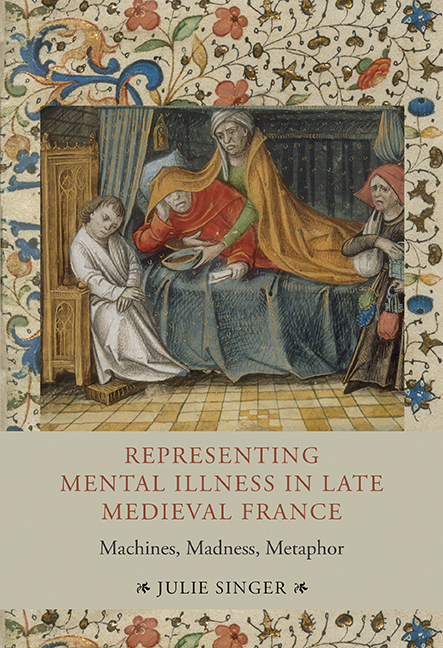Book contents
- Frontmatter
- Dedication
- Contents
- List of Illustrations
- Acknowledgements
- List of Abbreviations
- Introduction: Oxidation Before Oxygen
- 1 Of Metal and Men
- 2 Une enroullure de sapience: Instituting Princely Virtues at the Court of Charles V
- 3 Metaphors of the Body Politic
- 4 Le fer en la playe
- 5 Alain Chartier's rooil de oubliance
- Epilogue: Men Without Machines
- Bibliography
- Index
- Book part
5 - Alain Chartier's rooil de oubliance
Published online by Cambridge University Press: 15 October 2019
- Frontmatter
- Dedication
- Contents
- List of Illustrations
- Acknowledgements
- List of Abbreviations
- Introduction: Oxidation Before Oxygen
- 1 Of Metal and Men
- 2 Une enroullure de sapience: Instituting Princely Virtues at the Court of Charles V
- 3 Metaphors of the Body Politic
- 4 Le fer en la playe
- 5 Alain Chartier's rooil de oubliance
- Epilogue: Men Without Machines
- Bibliography
- Index
- Book part
Summary
The later years of Charles VI's reign were marked by political turmoil, military reversals, and civic unrest, from the defeat at Agincourt (1415) and the Burgundian taking of Paris (1418) to the Treaty of Troyes (1420), which declared the dauphin Charles illegitimate and made England's Henry V heir to the French throne. Upon his father's death in 1422 Charles VII was considered king in the areas loyal to him, which centered on Bourges in the Berry region. The dauphin's cause was famously bolstered by Joan of Arc's military campaign, which cleared the path to Reims for his coronation ceremony in summer 1429. Responses to the exploits of Joan of Arc figure among the final writings of several major political authors: Christine de Pizan, Jean Gerson, and Alain Chartier. More broadly speaking, the events of the latter half of Charles VI's reign inspired a continuing wave of political poems, many of which shift their focus from the cognitive capacities of the monarch to the author-narrator's often-unhealthy affective response to current events. In this chapter I will study how the vernacular political dits of Alain Chartier, spanning the years from Agincourt to the rise of Joan of Arc, respond to these tumultuous times through inquiries into the geography of the pathologically depressed mind.
Alain Chartier was a Norman, born in Bayeux, probably in the mid-1380s. He is twice mentioned as an officer in the household of Yolande d'Anjou (mother of René and mother-in-law of Charles VII), in account books covering the period from 1409 to 1414. His exact function in her household remains unknown, as do the dates of the two payments to him that are recorded in that account book. But we do know that it is to this period that Chartier's earliest surviving lyrics date: these are mostly occasional ballades, verse debates, and a Lay de plaisance. Chartier entered the service of the dauphin, the future Charles VII, by 1417, less than a year before the bloody Burgundian conquest of Paris and the dauphin's subsequent flight to Bourges. Alain Chartier followed the dauphin into exile, never to return to Paris.
- Type
- Chapter
- Information
- Representing Mental Illness in Late Medieval FranceMachines, Madness, Metaphor, pp. 245 - 290Publisher: Boydell & BrewerPrint publication year: 2018

